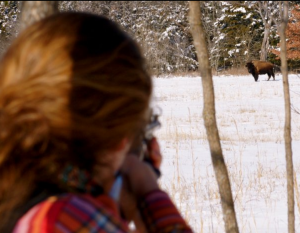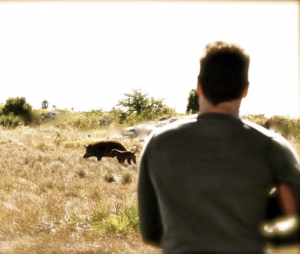Be the hunter, not the fighter.
 Fighting is a powerful calling for men; most male archetypes include a fighter/warrior aspect. Training to fight is also a great way to learn very important things related to security such as mobility and adaptability. But fighting does not provide security; the winning attitude developed in fighting may be contrary to the survival attitude needed in security. The purpose of fighting is to win, what is won, whether it is the attention of a pretty lady, the look on the face of the bully who thought he was in control, or a shiny cup is quite irrelevant, the purpose of fighting is, simply, to win.
Fighting is a powerful calling for men; most male archetypes include a fighter/warrior aspect. Training to fight is also a great way to learn very important things related to security such as mobility and adaptability. But fighting does not provide security; the winning attitude developed in fighting may be contrary to the survival attitude needed in security. The purpose of fighting is to win, what is won, whether it is the attention of a pretty lady, the look on the face of the bully who thought he was in control, or a shiny cup is quite irrelevant, the purpose of fighting is, simply, to win.
The concept of winning however implies that there is the possibility of not winning. In fact, the greater that possibility, the greater the fight. There is also the likelihood of being hit nearly as much as we hit the other guy, and if there are several other guys the cost of fighting is going up exponentially. Multiple opponents make for an epic, glorious fight… and a catastrophic security situation. The possibility of not winning is absolutely inacceptable in security.
Long ago Sun Tzu stated, “The good fighters of old first put themselves beyond the possibility of defeat, and waited for an opportunity of defeating the enemy.” already pointing to the truth that one does not need to beat his adversaries to defeat them. Considering security with a fighter mindset would be a great mistake.
Security is about survival and winning has nothing to do with it. Fighting is an unacceptable risk even if the odds are good; it can only be a last resort, and even in this case it has to be a fight with a fallback position.
The Red Baron would only fight if most of the conditions were favorable to him, following his famous “Dicta Boelcke” policy. Interestingly “fighter planes” in Germany and in France were called “hunter planes” instead. This difference in language is an interesting clue about their methods.
 When considering security issues one can simply not keep a fighter mindset. Adopting a hunter attitude is more effective. The hunter does not take unnecessary risks, importantly; he won’t even take a shot that may not bring certain results. While the fighter will have all his focus on his adversary moves and attitude, the hunter also will take in other parameters such as terrain, wind, and, importantly, the presence of dangers other than his intended target. In African Buffalo territory for instance one can see how the hunter will tread lightly, not only the African Buffalo has killed a few hunters, but the hunter is not the only predator around. The meaning of haste is not lost on any hunter if for whatever reason the herd is moving in his direction; there is nothing wrong into putting safety first. It is not cowardice to avoid unnecessary risks. I have much trouble convincing people about the invincibility of the swarm, but there is no need to explain the invincibility of the buffalo herd to the hunter. Not challenging larger, stronger or more numerous opponents is the only smart choice.
When considering security issues one can simply not keep a fighter mindset. Adopting a hunter attitude is more effective. The hunter does not take unnecessary risks, importantly; he won’t even take a shot that may not bring certain results. While the fighter will have all his focus on his adversary moves and attitude, the hunter also will take in other parameters such as terrain, wind, and, importantly, the presence of dangers other than his intended target. In African Buffalo territory for instance one can see how the hunter will tread lightly, not only the African Buffalo has killed a few hunters, but the hunter is not the only predator around. The meaning of haste is not lost on any hunter if for whatever reason the herd is moving in his direction; there is nothing wrong into putting safety first. It is not cowardice to avoid unnecessary risks. I have much trouble convincing people about the invincibility of the swarm, but there is no need to explain the invincibility of the buffalo herd to the hunter. Not challenging larger, stronger or more numerous opponents is the only smart choice.
A hunter will easily leave without taking a shot if all circumstances are not to his advantage. When forced to run for safety a hunter will never lose a second to shoot at one of the things running after him; there is nothing personal in the law of the jungle. We should keep this in mind when considering security in our modern jungles. Outwitting the opponents is more important than defeating them.


2 Comments
Pingbacks